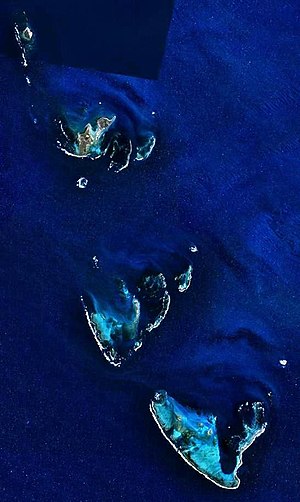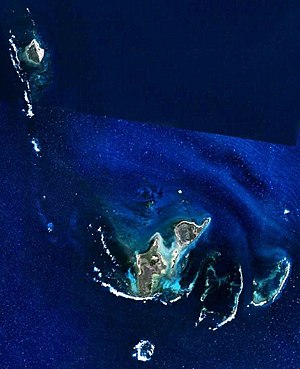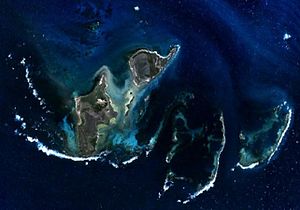28°28′S 113°42′E / 28.467°S 113.700°E
The Wallabi Group is the northernmost group of islands in the Houtman Abrolhos off the western coast of Western Australia.[1] it is 58 kilometres (36 miles) from the Australian mainland, and about 9 kilometres (5.6 miles) from the Easter Group.[2]
The group consists of a number of islands arising from a carbonate platform 17 kilometres (11 miles) long and up to 10 kilometres (6.2 miles) wide, and also the outlying North Island, located 14 kilometres (8.7 miles) to the northwest of the main platform. They are the most southerly well-established coral reef in the Indian Ocean.[3]: 3 The main islands are North Island, West Wallabi Island, East Wallabi Island, Long Island and Beacon Island.[2] The group is part of the Houtman Abrolhos Important Bird Area, identified as such by BirdLife International because of its importance for supporting large numbers of breeding seabirds.[4]
The Wallabi Group is best known for the shipwreck of the Batavia on Morning Reef near Beacon Island in 1629,[5] and the subsequent mutiny and massacres that took place among the survivors.[6] Another wreck for which the location is known is the Hadda, which was wrecked off Beacon Island in April 1877[7] and now lies about a kilometre north of it.[8]
Components of the island group
edit- Acute Bank
- Assail Bank
- Beacon Island
- East Wallabi Island
- Long Island
- North Island
- North East Reef
- Pigeon Island (Houtman Abrolhos)
- Shag Rock (Houtman Abrolhos)
- South Passage (Houtman Abrolhos)
- Suda Bay Passage
- The Flat (Houtman Abrolhos)
- Traitors Island
- West Wallabi Island
See also
editReferences
edit- ^ "Wallabi Group". Gazetteer of Australia online. Geoscience Australia, Australian Government.
- ^ a b "Houtman Abrolhos". oceandots.com. Archived from the original on 23 December 2010. Retrieved 13 October 2007.
- ^ Green, J. (1989). The loss of the Verenigde Oostindische Compagnie retourschip Batavia. British Archaeological Reports. Vol. 489. Oxford: BAR Publishing.
- ^ "IBA: Houtman Abrolhos". Birdata. Birds Australia. Retrieved 12 August 2011.
- ^ "Batavia". Western Australian Shipwrecks Database. Department of Maritime Archaeology, Western Australian Museum.
- ^ Dash, Mike (2002). Batavia's Graveyard. Great Britain: Weidenfeld & Nicolson. ISBN 0-575-07024-2.
- ^ "Hadda". Western Australian Shipwrecks Database. Department of Maritime Archaeology, Western Australian Museum.
- ^ Australia 1:100000 Topographic Survey, Map sheet 1641 (Edition 1): Wallabi


